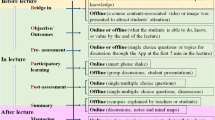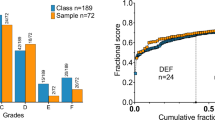Abstract
Online-based response systems are increasingly used as a continuous assessment tool in classroom due to availability and ease of access. The present study aimed to validate the utilisation of online-based exercises for teaching to medical students. For this study, Socrative, a free online platform was used in teaching a physiology component of a second year module. Students’ performance and evaluation of this approach was investigated with regard to participation in the class, understanding of the concepts and performance in the final exam. The performance of the class in multiple choice questions (MCQs) related to Socrative daily activities at the end of module and final exams was greater by some 24% (P < 0.05) compared to performance in questions with no Socrative background exercise. Moreover, the exam performance of students in 2016 after the introduction of Socrative was higher by 14% (P > 0.05) compared to a previous year, 2014 where no Socrative activities were used. The students’ feedback regarding the utilisation of online-based exercises showed ~85% of respondents think that these activities were either ‘very important’ or ‘important’ to enhance their participation in the class and ~88% indicated that it is either ‘very useful’ or ‘useful’ to consolidate their understanding of this module’s material. The findings from this study indicate that the use of online-based exercises through Socrative was positively received by medical students as an interactive classroom activity that also enhanced performance.





Similar content being viewed by others
Explore related subjects
Discover the latest articles, news and stories from top researchers in related subjects.References
Ali, S. H., Carr, P. A., & Ruit, K. G. (2016). Validity and reliability of scores bbtained on Multiple-Choice Questions: Why functioning distractors matter. Journal of the Scholarship of Teaching and Learning, 16(1), 1–14.
Al-Rukban, M. O. (2006). Guidelines for the construction of multiple choice questions tests. Journal of Family and Community Medicine, 13(3), 125–133.
Brown, S. (2010). Likert scale examples for surveys. ANR Program evaluation: Iowa State University, USA.
Butler, B. & McCarthy, M. (2015). What does Multiple Intelligences theory and practice have to offer universal design for learning? Available at: https://www.google.ie/url?sa=t&rct=j&q=&esrc=s&source=web&cd=1&cad=rja&uact=8&ved=0ahUKEwit9oy19YDTAhVDAcAKHTCLBoUQFggZMAA&url=https%3A%2F%2Fwww.ucc.ie%2Fen%2Fmedia%2Facademic%2Fteachingandlearning%2FWhatdoesMultipleIntelligencestheoryandpracticehavetoofferuniversaldesignforlearning.docx&usg=AFQjCNHPbMtr2zZocOkozxtNSZHu0F_CEw.
Castleberry, A. N., Schneider, E. F., Carle, M. H., & Stowe, C. D. (2016). Development of a Summative Examination with Subject Matter Expert Validation. American Journal of Pharmaceutical Education, 80(2), 29.
Coca, D. M., & Slisko, J. (2013). Software Socrative and smartphones as tools for implementation of basic processes of active physics learning in classroom: an initial feasibility study with prospective teachers. European Journal of Physics Education, 4(2), 17–28.
Crossgrove, K., & Curran, K. L. (2007). using clickers in nonmajors- and majors-level biology courses: student opinion, learning, and long-term retention of course material. CBE Life Sciences Education, 7, 146–154.
Dakka, S. M. (2015). Using socrative to enhance in-class student engagement and collaboration. International Journal on Integrating Technology in Education, 4(3), 13–19.
Dervan, P. (2014). Enhancing in-class student engagement using socrative (an Online Student Response System): a report. All Ireland Journal of Teaching and Learning in Higher Education, 6(3), 1801–1813.
Eijsvogels, T. M. H., van den Brand, T. L., & Hopman, M. T. E. (2013). Multiple choice questions are superior to extended matching questions to identify medicine and biomedical sciences students who perform poorly. Perspectives on Medical Education, 2, 252–263.
Gajjar, S., Sharma, R., Kumar, P., & Rana, M. (2014). Item and test analysis to identify quality multiple choice questions (MCQs) from an assessment of medical students of Ahmedabad, Gujarat. Indian Journal of Community Medicine, 39(1), 17–20.
Gulek, J. C., & Demirtas, H. (2005). Learning with technology: the impact of laptop use on student achievement. Journal of Technology, Learning, and Assessment, 3(2).
Heelan, A. (2015). Universal Design for Learning (UDL): Implications for Education. Universal Design in Education Conference, Dublin: Dublin Institute of Technology.
Lasry, N. (2007). Peer instruction: Comparing clickers to flashcards [Online]. Available: Retrieved 2017, from http://arxiv.org/abs/physics/0702186v1. [Accessed].
Latham, A., & Sharon Hill, N. (2013). Preference for anonymous classroom participation: linking student characteristics and reactions to electronic response systems. Journal of Management Education, 38(2), 192–215.
Lavin, A. M., Korte, L., & Davies, T. L. (2011). The impact of classroom technology on student behavior. Journal of Technology Research, 2, 1–13.
Lefever, R. & Currant, B. (2010). How can technology be used to improve the learner experience at points of transition?, http://technologyenhancedlearning.net/files/2010/04/ELESIGliteraturereviewFINAL240210.pdf.
Mazur, E. (1997). Peer instruction: A user’s manual. Upper Saddle River: Prentice Hall.
McGahee, T. W., & Ball, J. (2009). How to read and really use an item analysis. Nurse Educator, 34, 166–171.
Nawalaniec, N. (2015). Socrative (Snowy release). Journal of the Medical Library Association, 103(4), 236–239.
Rae, M. G., & O'Malley, D. (2017). Using an online student response system, Socrative, to facilitate active learning of Physiology by first year graduate entry to medicine students: a feasibility study. MedEdPublish. https://doi.org/10.15694/mep.2017.000004.
Silverthorn, D. U. (2006). Teaching and learning in the interactive classroom. Advances in Physiology Education, 30, 135–140.
Tim Wood, T. & Cole, G. (2001). Developing Multiple Choice Questions for the RCPSC Certification Examinations. The Royal College of Physicians and Surgeons of Canada office of Education.
Tretinjak, M. F., Bednjanec, A. & Tretinjak, M. (2015). Interactive teaching with Socrative. 38th International Conventionon Information and Communication Technology Electronics and Microelectronics MIPRO 2015 - Proceedings, 848‑851.
Wash, P. D. (2014). Taking advantage of mobile devices: using Socrative in the classroom. Journal of Teaching and Learning with Technology, 3(1), 99–101.
Yeong, F. M. (2015). Use of constructed-response questions to support learning of cell biology during lectures. Journal of Microbiology and Biology Education, 16(1), 87–89.
Author information
Authors and Affiliations
Corresponding author
Ethics declarations
Conflict of interest
The author has no conflict of interest.
Rights and permissions
About this article
Cite this article
Abdulla, M.H. The use of an online student response system to support learning of Physiology during lectures to medical students. Educ Inf Technol 23, 2931–2946 (2018). https://doi.org/10.1007/s10639-018-9752-0
Received:
Accepted:
Published:
Issue Date:
DOI: https://doi.org/10.1007/s10639-018-9752-0




